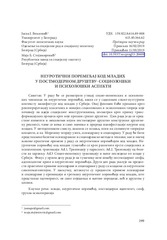Приказ основних података о документу
Neurotic disorder in youth in the postmodern society: Sociological and psychological aspects
Neurotični poremećaj kod mladih u postmodernom društvu - sociološki i psihološki aspekti
| dc.creator | Veljković, Jasna J. | |
| dc.creator | Stojimirović, Maja | |
| dc.date.accessioned | 2021-04-02T12:26:07Z | |
| dc.date.available | 2021-04-02T12:26:07Z | |
| dc.date.issued | 2019 | |
| dc.identifier.issn | 0085-6320 | |
| dc.identifier.uri | http://rfpn.fpn.bg.ac.rs/handle/123456789/726 | |
| dc.description.abstract | The paper will discuss the impacts of socio-economic and psychological factors on the neurotic disorder in young population: the way it is manifested in the current socio-cultural context in Serbia. This phenomenon will be presented through a reinterpretation of classical, as well as sociological and psychological theories, based on the idea of social constructivism, seen through the prism of the transformation processes of Serbian society. The aim of the paper is to present the elements and mechanisms by which the postmodern society constructs a social reality, which also changes the meaning and nature of the manifestation of neurosis among young people. In methodological terms, in addition on the aforementioned theoretical concepts, the analysis also relies on Moreno's role theory, psychodrama and sociodrama. In this paper, we will present the basic psychodrama and sociodrama methods and techniques as well as the advantages of their practical application in the treatment of neurotic disorders in young population. Neurotic disorders in youth will be interpreted through various types of social and psychological transitions: 1. transition into adulthood; 2. transition from mental illness to health; 3. socio-economic transition and its consequences for young people in Serbia. In the first part of the paper, the focus is on interpreting the relationship between the postmodern self, the adolescent crisis, and the neurotic disorder. The second part represents the ways in which psychodrama and sociodrama can be practically applied in the treatment of young people with neurotic symptomatology. In the conclusion, we emphasized the advantages of using psychodrama and sociodrama for the purpose of prevention and treatment of the neurotic disorders in young population which is a responsibility not only of the individual and his/ her family, but of the society as a whole. | en |
| dc.description.abstract | U radu će se razmatrati uticaj socio-ekonomskih i psiholoških činilaca na neurotični poremećaj, kakav se u sadašnjem socio-kulturnom kontekstu manifestuje kod mladih u Srbiji. Ovaj fenomen biće prikazan kroz reinterpretaciju klasičnih i novijih socioloških i psiholoških teorija koje počivaju na ideji socijalnog konstruktivizma, posmatran kroz prizmu transformacijskih procesa kroz koje prolazi srpsko društvo. Cilj rada je da se predstave elementi i mehanizmi kojim postmoderno društvo konstruiše društvenu realnost, čime se menja i samo značenje i priroda manifestacije neuroze kod mladih. U metodološkom smislu, analiza se oslanja, osim na spomenute teorijske koncepte, i na Morenovu teoriju uloga, psihodramu i sociodramu. U radu će biti predstavljene bazične psihodramske i sociodramske metode i tehnike, kao i značaj njihove praktične primene u radu sa neurotičnim poremećajem kod mladih. Neurotični poremećaj kod mladih tumačiće se kroz različite vrste socijalnih i psiholoških tranzicija: Ad.1. Tranziciju u odraslost; Ad.2. Tranziciju od bolesti ka zdravlju; Ad.3 Socio-ekonomsku tranziciju i njene posledice po mlade u Srbiji. Fokus u prvom delu rada je na tumačenju veze između postmodernog selfa, adolescentne krize i neurotičnog poremećaja. Drugi deo rada ukazuje na prednosti praktične primene psihodrame i sociodrame u radu sa mladima sa neurotskom simptomatologijom. U zaključku, istaknute su prednosti primene psihodrame i sociodrame u prevenciji i tretmanu neurotičnog poremećaja kod mladih, što predstavlja odgovornost, ne samo pojedinca i njegove porodice, već i društva u celini. | sr |
| dc.publisher | Sociološko društvo Srbije, Beograd | |
| dc.rights | openAccess | |
| dc.rights.uri | https://creativecommons.org/licenses/by-sa/4.0/ | |
| dc.source | Sociološki pregled | |
| dc.subject | youth | en |
| dc.subject | neurotic disorder | en |
| dc.subject | postmodern identity | en |
| dc.subject | self | en |
| dc.subject | group psychotherapy | en |
| dc.subject | mladi | sr |
| dc.subject | neurotični poremećaj | sr |
| dc.subject | postmoderni identitet | sr |
| dc.subject | self | sr |
| dc.subject | grupna psihoterapija | sr |
| dc.title | Neurotic disorder in youth in the postmodern society: Sociological and psychological aspects | en |
| dc.title | Neurotični poremećaj kod mladih u postmodernom društvu - sociološki i psihološki aspekti | sr |
| dc.type | article | |
| dc.rights.license | BY-SA | |
| dc.citation.epage | 232 | |
| dc.citation.issue | 1 | |
| dc.citation.other | 53(1): 199-232 | |
| dc.citation.rank | M24 | |
| dc.citation.spage | 199 | |
| dc.citation.volume | 53 | |
| dc.identifier.doi | 10.5937/socpreg53-20609 | |
| dc.identifier.fulltext | http://rfpn.fpn.bg.ac.rs/bitstream/id/509/723.pdf | |
| dc.type.version | publishedVersion |

